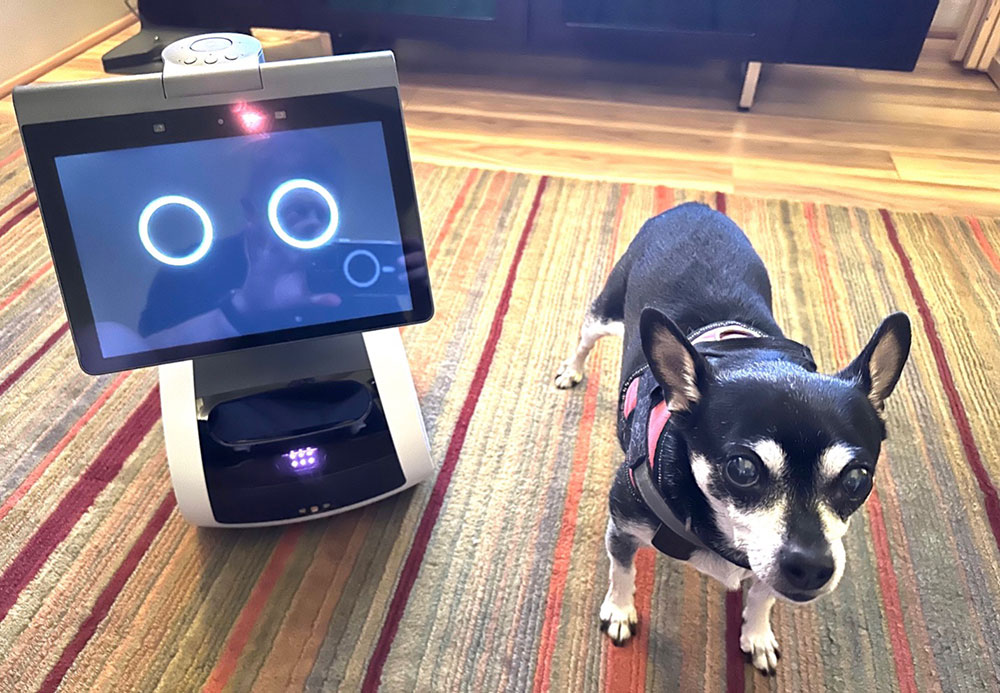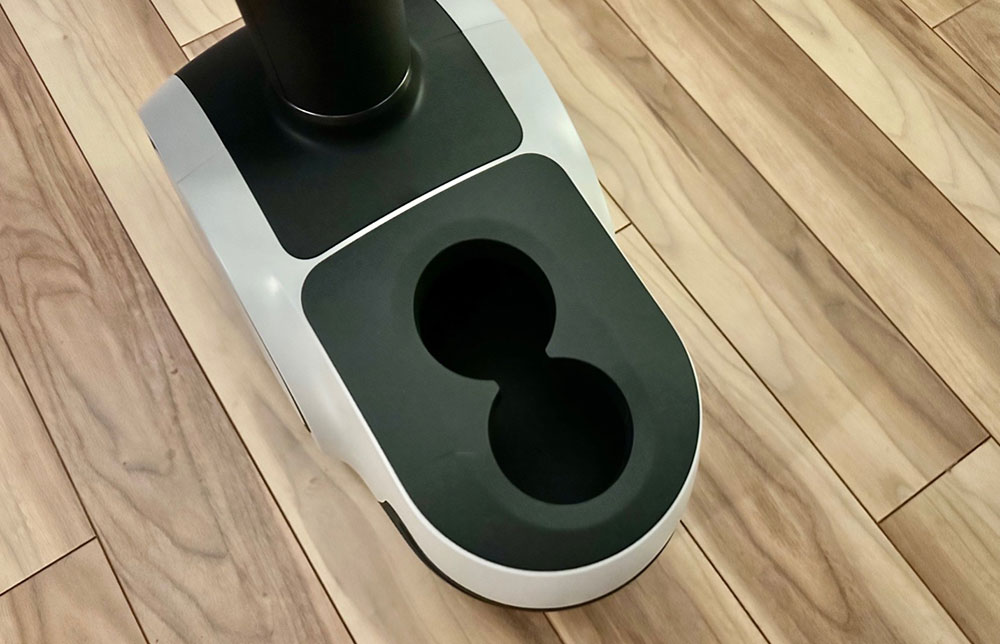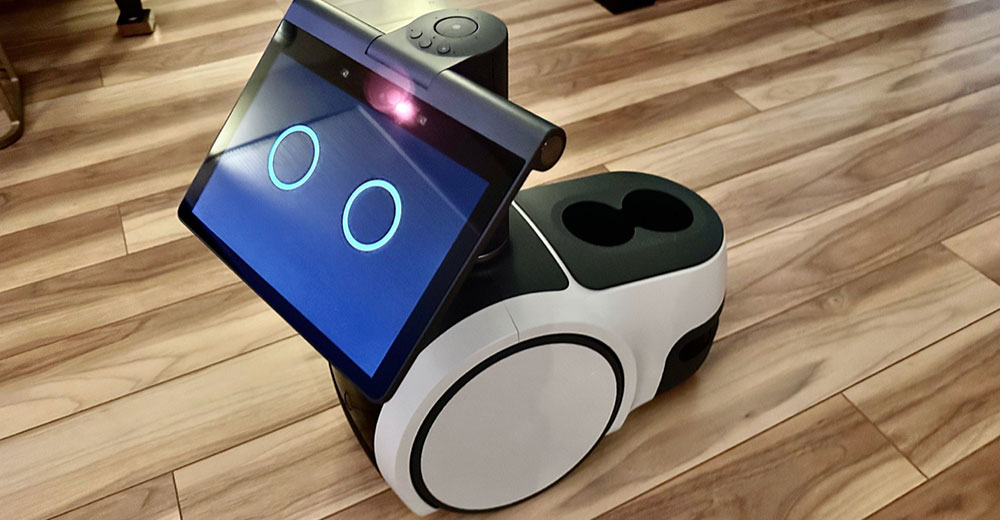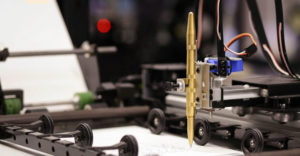I was fortunate to get a chance to spend some time with Amazon’s new robotic sidekick, Astro, over the past week.
Presumably named Astro because of Amazon’s fondness for the lovable dog on the 1960s cartoon series “The Jetsons,” it is now available on an invite-only basis for $1,000. However, the price will eventually climb to $1,450 when it becomes open to the public.
Seven days is a meager amount of time to assess a new piece of technology, but I think it’s sufficient to form some early opinions about this ambitious piece of hardware.
After spending a week with the product, I’ve concluded that it largely succeeds as a luxury item, particularly for those consumers with the disposable income to check out the latest bleeding-edge robotics technology, though the usage models are limited.
To be clear, that’s not a slam against Astro. Products like this pave the way for more compelling future solutions to ultimately get to market with broader mainstream appeal. Astro is a fascinating solution with significant potential. Still, it will not likely find a substantial audience given its premium price point and, most importantly, limited cases with what it can be used for.
What Is Amazon Astro?
If one didn’t know any better, they could mistake the new Amazon Astro with the Echo Show 10 smart display on oversized wheels. From a side view, it almost looks like a downsized non-passenger version of the iconic Segway personal transporter devices commonly seen in airports or shopping malls.
Astro has a motorized 10.1″ screen and a 5 MP camera that facilitates video chat and video/image capture. Two 55mm speakers embedded in the front provide surprisingly good audio with excellent bass. Astro has some heft to it, weighing 20.6 pounds and roughly the size of a footstool.
Like the popular Echo Show models, Astro is fully Alexa-compliant with the ability to stream TV show content, play music, answer questions about nearly any topic, and control any Alexa-based smart home devices.
Astro is equipped with several highly sensitive array-based microphones, and its listening skills are exceptional. This is noteworthy because array microphones are used traditionally for measuring and locating noise sources, an attribute critical for its home security monitoring capabilities.
However, what separates Astro from a stationary Echo Show is its ability to move and alter its viewing perspective. Astro has a periscope designed into it that rises from its pivoting head and provides additional 12 MP camera support.
The obvious usefulness of the cameras is that Astro can travel through your home when you’re out and about to capture video and images. The periscope also includes manual mute and volume buttons, though you’re unlikely to use them because it can respond to voice commands like any Alexa-class speaker.
One of the things the Amazon engineering team deserves kudos for is Astro’s navigation performance.
While the out-of-the-box setup process is startlingly easy, it takes about 30 minutes for Astro to conduct its initial run to learn all the rooms on your ground floor.
After the setup was completed, Astro could effortlessly travel to whatever room I designated via voice command. At no time did Astro bump into anything in its path, and it never ran into the beloved Miniature Pinscher who inhabits my home. Its large wheels also allow Astro to travel on both rugs and hardwood floors without any obvious difficulty.

Caramel never seemed to be threatened by Astro traveling through my home. (Image Credit: SmartTech Research)
Last month, Amazon announced that Astro would ultimately acquire pet monitoring capability and check your doors and windows to notify you if they’re not secure. Amazon also supplies several colleges with an Astro software development kit to create even more automated procedures.
Something to keep in mind: Astro exhibits quirky behavior, even when docked in its charging station and seemingly asleep. Although thankfully it didn’t do this late at night, Astro used two animated eyes and lively beeps, I assume, to ensure that you’re aware that it’s at your beck and call.
Some people might find this off-putting, but it’s clear that Amazon wants Astro to have a distinct personality that differentiates from its family of smart displays.
Does Astro Deliver Useful Tasks?
The $64,000 question that mainstream users want to be answered is about Astro’s usefulness. As mentioned above, the setup process was remarkably sleek with on-screen directions, and pairing it to my home network took just a few seconds.
Although having an Astro is undoubtedly one of the more interesting conversation topics an owner will have at a cocktail party in their home, what can it actually do?
Astro does have a dual cup holder that allows you to transport drinks from one room to another, though I can’t imagine being so lazy that I would use that feature. Of course, it’s easy to give Astro a voice command to travel to the kitchen, but it can’t remove drinks from the refrigerator. That’s the kind of Jetsons-like feature that would be a game changer.

Astro’s dual cup holders (Image Credit: SmartTech Research)
Astro’s most serious usage model is its ability to act as a mobile sentry in your home. A camera-enabled robot that can travel throughout your home and work synergistically with Ring smart door locks and external cameras via Alexa Guard could be compelling.
Leveraging Astro’s remote-control camera functionality is what I believe will appeal to many mainstream consumers. When the live feed feature is enabled via its app, Astro enunciates a ring to let other people in its vicinity inform people they’re about to be on camera.
The periscope rises out of Astro to provide a clear and live view of the home. The app also offers manual support to control the robot’s movement in different directions for different views — even sliding the periscope up or down for varied perspectives.
Astro truly excels as a security device when you’re away from home. After pairing it with a Ring Protect Pro subscription, Astro can patrol your home and send notifications to your smartphone when it identifies strangers or hears a loud noise like breaking glass.
There is also the ability to enable a siren on Astro to scare away intruders remotely. I successfully simulated a loud noise by having someone throw a tennis ball off a nearby window, and Astro dutifully traveled to where it believed the location of the noise.
It initiated the siren and sent an alert to my phone. My testing was not scientific, and I can’t confirm that Astro will flawlessly function in comparable security scenarios, but the use case is promising.
Closing Thoughts
Aside from being a mobile security platform inside your home — and that, by itself, could be sufficient for many people to buy one — its other use cases are limited and scant.
After all, Astro can’t take out the trash, and it doesn’t function as a robot vacuum. Amazon also pitches Astro as a device that can play with kids, as it can sing and dance, but $1,500 is a premium price for that novelty which would quickly wear off with children.
A stronger case can be made for Astro’s entertainment and video conferencing features, as having a mobile device for video chatting with other Echo Show owners is intriguing. In addition, the great-sounding speakers could be valuable at parties as Astro can follow you around your home playing music.
The bottom line is that Astro is a fascinating device that Amazon has a lot to be proud of. Here’s a short video I made of Astro in action:
Even in a limited security use case context, Astro has significant potential. It will be beguiling to see other use cases developed (perhaps by parties outside of Amazon) currently not contemplated.
Its navigation ability is superb, and the overall quality and construction material of Astro is excellent, which is reassuring for such a high-priced device.
Finally, Amazon deserves props for doing a notable job of protecting your privacy with Astro. Given Amazon’s spotty record on privacy, it’s a step in the right direction that Astro locally stores and processes most of its navigation and facial recognition data on the device itself.
Consistent with other Alexa-based smart speakers and displays, users can also erase query history via the Alexa app. This capability is critical given that video devices, which are increasingly showing up inside people’s domiciles, have the potential to record highly personal and intimate moments. For this new category to gain mainstream traction, eliminating the privacy concerns that many consumers have is non-negotiable.
Nonetheless, $1,500 is a considerable discretionary expenditure for a sizeable portion of the population, particularly with sky-high gasoline prices and inflation continuing to run near 9%.
It’s hard to recommend Astro at this price point until its gains more utility than as a mobile security platform inside the home.
Astro is an exciting solution demonstrating Amazon’s considerable technological chops in the fledgling consumer robotics space. At the very least, early adopters who get one will be the talk of their neighborhoods.

























































